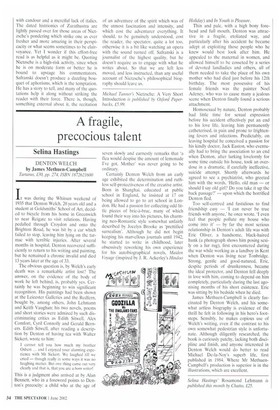A fragile, precocious talent
Selina Hastings
DENTON WELCH by James Methuen-Campbell
Tartarus, £30, pp. 274, ISBN 1872621600
It was during the Whitsun weekend of 1935 that Denton Welch, 20 years old and a student at Goldsmiths' School of Art, decided to bicycle from his home in Greenwich to near Reigate to visit relations. Having pedalled through Croydon and onto the Brighton Road, he was hit by a car which failed to stop, leaving him lying on the tarmac with terrible injuries. After several months in hospital, Denton recovered sufficiently to return to his writing and painting, but he remained a chronic invalid and died 13 years later at the age of 33.
The obvious question is, by Welch's early death was a remarkable artist lost? The answer, on the evidence of the body of work he left behind, is, probably yes. Certainly he was beginning to win significant recognition. His paintings had been shown at the Leicester Galleries and the Redfern, bought by, among others, John Lehmann and Keith Vaughan; his two novels, poems and short stories were admired by such discriminating critics as Edith Sitwell, Alex Comfort, Cyril Connolly and Gerald Berners. Edith Sitwell, after reading a description by Denton of having tea with Walter Sicken, wrote to him:
I cannot tell you how much my brother Osbert ... and I enjoyed your alarming experience with Mr Sickert. We laughed till we cried — though really in some ways it was no laughing matter. But one thing came out very clearly and that is, that you are a born writer!
This is a judgment also arrived at by Alan Bennett, who in a foreword points to Denton's precocity: a child who at the age of seven slowly and earnestly remarks that 'a flea would despise the amount of lemonade I've got, Mother' was never going to be ordinary.
Certainly Denton Welch from an early age exhibited the determination and ruthless self-protectiveness of the creative artist. Born in Shanghai, educated at public school in England, he insisted at 17 on being allowed to go to art school in London. He had a passion for collecting odd little pieces of bric-a-brac, many of which found their way into his pictures, his charming neo-Romantic style somewhat unfairly described by Jocelyn Brooke as 'prettified surrealism'. Although he did not begin keeping his marvellous journals until 1942, he started to write in childhood, later obsessively reworking his own experience for his autobiographical novels, Maiden Voyage (inspired by J. R. Ackerley's Hindoo Holiday) and In Youth is Pleasure.
Thin and pale, with a high bony forehead and full mouth, Denton was attractive in a fragile, etoliated way, and particularly after his accident he became adept at exploiting those people who he knew would best look after him. He appealed to the maternal in women, and allowed himself to be cosseted by a series of devoted landladies and others, all of them needed to take the place of his own mother who had died just before his 12th birthday. The most possessive of his female friends was the painter Noel Adeney, who was to cause many a jealous scene when Denton finally found a serious attachment.
Homosexual by nature, Denton probably had little time for sexual expression before his accident effectively put an end to his love life, leaving him permanently catheterised. in pain and prone to frightening fevers and infections. Predictably, on leaving hospital he conceived a passion for his kindly doctor, Jack Easton, who eventually had to bring the association to an end when Denton, after lurking lovelornly for some time outside his house, took an overdose in a dramatic, if carefully ineffective, suicide attempt. Shortly afterwards he agreed to see a psychiatrist, who greeted him with the words, 'Hello, old man — or should I say old girl? Do you take it up the back passage?' — upon which the horrified Denton fled.
Too self-centred and fastidious to find friendship easy — 'I can never be true friends with anyone,' he once wrote. 'I even feel that people pollute my house who come into it' — by far the most serious relationship in Denton's adult life was with Eric Oliver, a handsome, black-haired hunk (a photograph shows him posing sexily on a fur rug), first encountered during the war while working as a landboy in Kent when Denton was living near Tonbridge. Strong, gentle and good-natured, Eric, despite periods of drunkenness, became the ideal protector, and Denton fell deeply in love with him, coming to depend on him completely, particularly during the last agonising months of his short existence. Eric was sitting by his bedside when he died.
James Methuen-Campbell is clearly fascinated by Denton Welch, and his somewhat artless biography is evidence of the thrill he felt in following in his hero's footsteps. Sensibly, he makes copious use of Welch's writing, even if the contrast to his own somewhat pedestrian style is unfortunate. Although diligently researched, the book is curiously patchy, lacking both discipline and finish, and anyone interested in Denton Welch would do better to read Michael De-la-Noy's superb life, first published in 1984. Where Mr MethuenCampbell's production is superior is in the illustrations, which are excellent.






































































 Previous page
Previous page